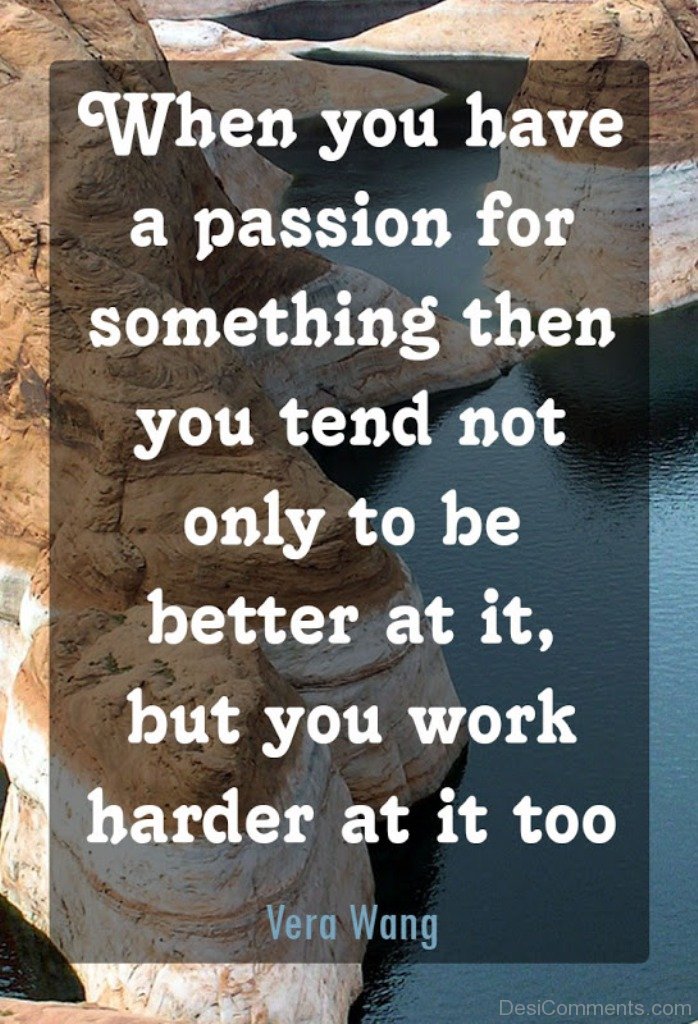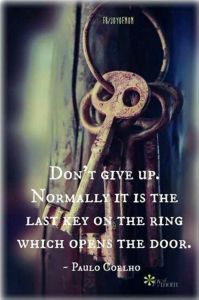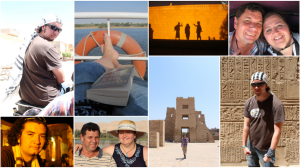Pondering on life: Are all quotes quotable?

So many ‘happy’ quotes – some about real joy and some about fake ‘happiness’?
Think before you quote. Test before you believe.
It is absolutely okay to be happy. I know a lot of happy people. I am happy. Not all-the-time- screaming-from-the-rooftop-happy, but happy within myself and especially happy within our little family unit. When things didn’t go so well in life, I found myself still feeling happy most of the time, because I have Someone to believe in and people around who loved me, and therefore I always had/have hope. And when it is going really well, I still have ‘down’ days. But overall – in my heart – I know I am ‘happy’. I think that is pretty average for most people.
Let’s get the Boring Definitions Over
According to Wikipedia, happiness is a mental or emotional state of well-being. http://en.wikipedia.org/wiki/Happiness)
Dictionary.com describes happiness as the quality or state of being happy, good fortune, pleasure, contentment, joy. And the opposite it states, is misery. (http://dictionary.reference.com/browse/happiness?s=t)
Preaching the ‘Gospel’ of Happiness
Social media pages are filled with quotes on everything under the sun, but the one theme that probably frequents more than others, is ‘happiness’. Happiness – it seems – is more sought after than most other wants or needs.
There is nothing wrong with being happy or wanting to be happy. I think that happiness is a very basic want and something all (I hope) people want to be – for the right reasons. But sometimes I read quotes coming along and I wonder about the driving force behind it. The quotes about success and ambition and happiness are by far the ones making me think more than the ones on love, caring etc. do.
I sometimes read a quote and I can’t help to think that modern man had become its own little god. Some of these quotes are all about ‘me’. “Think positive thoughts and get what you want from life”, “Do what makes you happy”, “Avoid people who makes you unhappy”, “Nice won’t get you anywhere”.
And then there are the advertisements. Being rich, being thin, buying the newest phone, tablet or TV, clothes, toys for your children, going on this or that new diet, taking this or that newly developed supplement etc. etc. etc. will make you… you guessed it – happy!
This way of searching for selfish happiness is all about me, me, me and feeds the little god modern-us created within ourselves.
With all the ‘happiness’ that is preached to us via the happiness ‘evangelists’s’ quotes and ads and movies, I am really surprised that the world is in such a state of unruliness, chaos, poverty, violence and… UNhappiness.
‘Case Study’#1
I know a person who is unhappy all the time. I know her for a very long time and this had always been the case. No one she is with or had been with or anything one can do for her could cause her to be in a constant state of happiness or contentment. (Or maybe she is happy, but has an unhappy way of showing it. One must always be optimistic!) Of course she had tragedy in her life, but she also had love and privileges and favour. I think about her well-being – or absence there-of – a lot and wonder if she would ever find something to make her happy. I wonder if she will ever find joy within herself. Sadly, only if some miracle happens very soon, I don’t think she will ever become so happy that she would influence other people’s lives only positively. A few years back I had a conversation with some people close to her and for the first time I really realised how many people get influenced on person’s actions and behaviour – positively or negatively. Although I always suspected that she had quite a damaging influence on their lives, I never thought it to be that destructive. That night, I made a decision again to try to only be a positive influence on the lives of people I have relationships with. This is a daily challenge.
It is impossible for me to ignore this person or cut her out of my life, so those quotes to “Ignore negative people” or to “Surround yourself with people who make you happy”, is not always a practical option. Of course it is better to be around only nice, ‘happy’ and positive people. Of course we sometimes have to make the difficult decision to cut a relationship with a person who really derail our lives or behave improperly towards us, but sometimes we just can’t. Because sometimes, those ‘unhappy’ or negative person is a spouse or a child or a parent or a sibling or a friend who needs a joyful, ‘happy’, positive person (like you and me, of course) in their lives. Or is a spouse or a child or a parent or a sibling or a friend who have a serious psychological illness and needs us to be there for them. To cut my ‘unhappy’ persons out of my life, would be selfish and in the end self-destructive. Because who will be there for me in my unhappy moments if my all-the-time positive, ‘happy’ spouse, child, parent, sibling or friend had also decided to cut me out..?
Just cutting people out, would mean that we care only about ourselves and conforming to the world around us where everything is about me and me alone and what I can get from every relationship and situation I am in. There will be no caring, no reaching out to people who needs us.
“Case Study’ #2
We currently live in Egypt. There is a well-known place close to our suburb in Cairo, called Mokattam. There is a place is called ‘Garbage City’. In there, live people who, for generations, gathers this large city’s garbage, sorts it and recycles it. When driving through there as a Westerner, you see sites that you would never have believed if you didn’t see it with your own eyes. When you dare to open your window, flies swarm into your vehicle and you’re greeted by the very distinct smell of rotten everything. I have seen the thinnest cow there that I’ve ever seen in my life! Yet, I observed something that both surprised and shocked me. I saw men, women and children working in the streets and inside open doored houses, hands halfway into garbage, sorting, working, talking, laughing. I saw children walking home from school, clean and neatly dressed. And I saw something in their eyes that I didn’t expect to see there. ‘Happiness’. What a very uncharacteristic place to find such a thing! But that was exactly what I saw – big, joyful eyes sparkling with light.
At first I thought that I was mistaken, so I didn’t say anything about this observation to anyone. Then as time went on and I have been in conversations about the place, people made the same remarks.
So, how is it possible that you can have two sorts of persons – one who has a relatively easy life and is never happy and the other who has a to-the-eye miserable life and seems ‘happy’? That is one of life’s great mysteries. Maybe it is because happiness isn’t a goal or a destination on its own, but a state of mind that one must find in oneself. Maybe happiness isn’t something to chase after and try to hunt down, to dream about, to ‘find’. Maybe happiness is in all of us, just waiting to be found. Or not.
‘Case Study’ #3
I don’t know Sir Richard Branson in person, but I read some of his books. I admire him for a few reasons. One, is that he is dyslexic and that I have learned to regard persons with dyslexia very highly, because most of the time, they are very clever people. I had quite a few of them in my Writing Clubs in the past and they are sharp and creative and think outside the box. Sir Richard can’t spell and didn’t finish school and yet he had written and published books. My spelling, on the other hand, is above average, I finished school and have a degree and yet I haven’t fulfilled my dream of publishing a book!
Back to the point of being happy. Branson claims in his books that you must just follow your passions in life and “success will follow”. He left school and started a magazine with very little resources. That was the first of his eight billion-dollar businesses (in different sectors). Success indeed followed his passionate efforts.
I haven’t published books yet (okay I have a self-published one on Kindle) and I haven’t made my billions yet. I don’t know if I will ever make billions, and I’m okay with that. But I really, really hope to get my books published. So, somehow, I believe what he says. The Bible teaches us “to do what our hands find to do” and to be “content with what we have”. That doesn’t mean that we can’t work harder and strive for better. But I believe that even though Sir Richard isn’t a Bible believer, he is following this advice.
Take More Pics and Less Selfies
I really believe what “if we do what our hand find to do”, means to use our God-given talents, passions and character traits to fulfil our purpose in this life, and when we do that will find ‘happiness’. And if we use those given passions, talents and character traits to help others, we won’t have to look for happiness, because it will come looking for us.
So, maybe ‘happiness’ isn’t something that we should even worry about or aspire to, but just live our lives to the best of our abilities, do what we can with what we have, reach out to others, give what we can give and don’t be so goal driven to feed our little inner-god.
Perhaps, if we take more pictures of the beautiful creation around us and of other people and less duckface selfies – to use contemporary social media generation language – we may see that we are surrounded by ‘happiness’.
© 2015 – I, Fielies (Riëtte) De Kock tries hard to be a Proverbs 31-woman – excellentest wife, finest mom, greatest lover and successful ‘wordpreneur’ all at the same time. I temporarily share my living space in Cairo, Egypt with my husband, young-adult son, the building’s ginger cat – and the space in my head with way too many ideas and multitudes of story characters to live as a normal functioning human being.
My children’s book, Yeovangya, is available at http://www.amazon.co.uk/Yeovangya-Riette-De-Kock-ebook/dp/B008CP2RQ0



























































